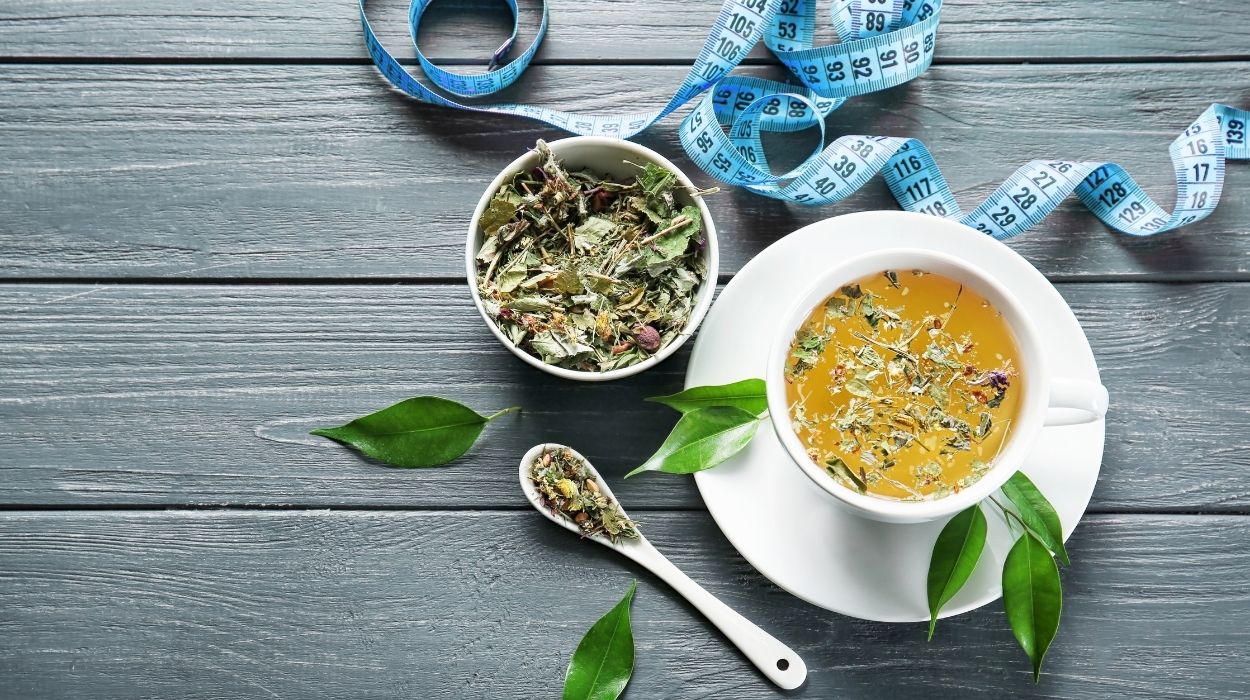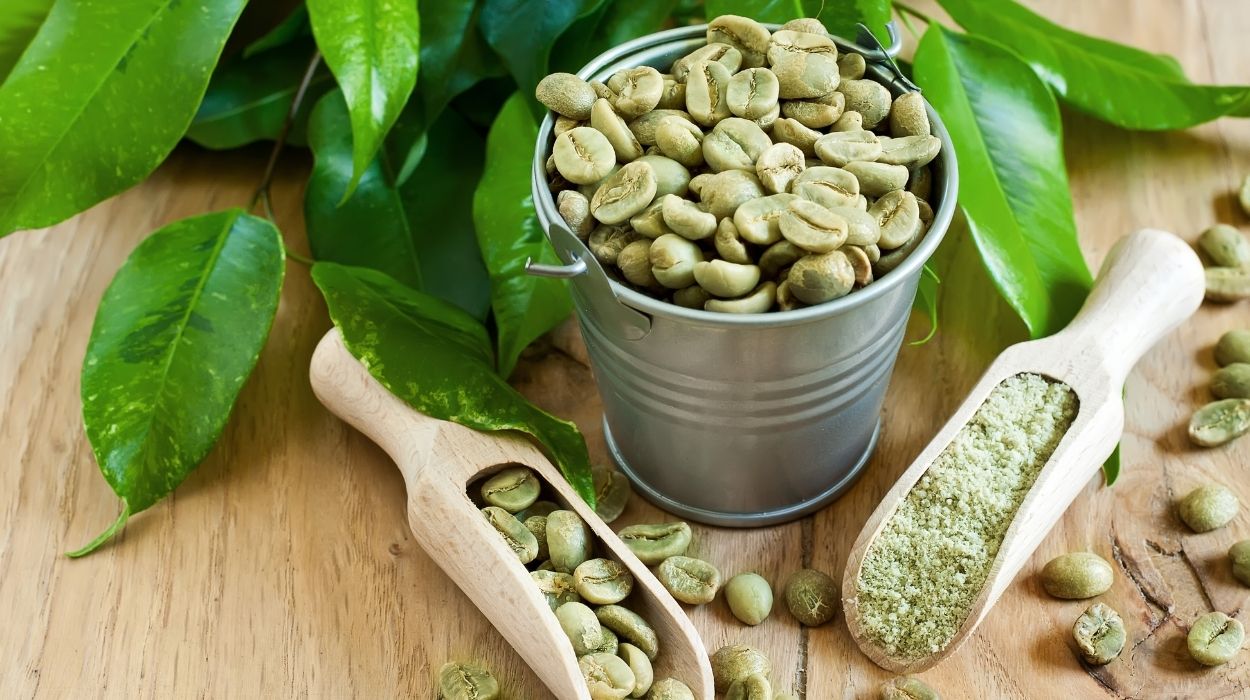Herbs are the leaves of plants[1] that can be eaten raw, cooked, or dried or taken in tea or supplement form. Herbs are used all over the world for medicinal and culinary purposes. Traditional Chinese medicine,[2] or TCM, has relied on herbs to treat various health conditions, including obesity, for thousands of years.
Herbs have flavorful, pungent smells and tastes, so many people use them for cooking. However, many people use herbs for weight loss. But how do you know which herbs are good for weight loss? This article will outline 16 of the best herbs that can promote weight loss and provide other health benefits. We also provide examples of how to use them in your everyday meals.
16 Natural Herbs For Weight Loss
Herbs have powerful medicinal properties and health benefits, one of which is the ability to assist in weight loss. The best herbs for weight loss are:
- Turmeric.
- Cayenne pepper.
- Ginger.
- Cinnamon.
- Fenugreek.
- Green coffee bean extract.
- Ginseng.
- Garlic.
- Black pepper.
- Cumin.
- Dandelion.
- Cardamom.
- Caralluma Fimbriata.
- Gymnema Sylvestre.
- Fennel.
- Bofutsushosan.
Best Herbs For Weight Loss

There are several herbs that have been studied specifically for their effect on body weight that can be successfully included in a weight loss diet plan. Although many of these studies have been conducted on mice or other animals, scientists are optimistic that similar outcomes can be achieved in humans.
Below are 16 of the best herbs to help you lose weight:
Turmeric
Consuming turmeric, either in supplement or food form, provides antioxidants, which lowers inflammation.[3] Obesity is largely driven by oxidative stress[4] and inflammation, therefore, turmeric has a potential anti-obesity effect. This is largely due to curcumin, the main chemical compound in turmeric, which is responsible for much of turmeric’s anti-inflammatory properties.
In patients with metabolic syndrome,[5] turmeric reduces waist circumference, body mass index, BMI, and body weight. Curcumin, through interactions with the gut microbiome, may also boost metabolism[6] by increasing energy expenditure.
Cayenne Pepper
Cayenne pepper has been shown to benefit weight loss in numerous ways. Studies show that capsaicin, the active component in chili peppers, can increase satiety,[7] boost metabolism, improve gut microbiome diversity, and activate brown adipose tissue,[8] which helps fat-burning and decreases overall body fat percentage. These functions, individually and collectively, can help counteract obesity.
Ginger
Ginger is a herb commonly used to treat gastrointestinal[9] disorders and to soothe gut discomfort. Taking herbs like ginger can support your digestive health, decrease systemic inflammation, and may help you lose upper belly fat.
However, ginger is effective for weight loss beyond its ability to help you lose belly fat. A meta-analysis of 14 studies concluded that ginger supplementation reduced overall body weight[10] in most of the participants.
These studies further showed that ginger reduced waist-to-hip ratio and hip ratio, and increased high-density lipoprotein-cholesterol levels, otherwise known as good cholesterol. Ginger had no negative effects on BMI. Ginger is used widely in TCM. However, many Western practitioners use it as well.
Cinnamon
At first glance, cinnamon may be associated with weight gain because it is a spice that is often used in desserts. While desserts may not be great for weight loss, cinnamon itself is. Data from 12 trials was reviewed to see the effects of cinnamon[11] on weight loss, and results showed that cinnamon significantly reduced body weight, waist circumference, and fat mass.
Based on these findings, experts say cinnamon can be used to treat obesity and to help reduce belly fat.
Fenugreek
Fenugreek is a medicinal plant used worldwide to treat diabetes and to control appetite. In studies conducted on rats that were fed a high-fat diet, fenugreek extract was able to block fat accumulation.[12] Additionally, fenugreek can restore balance in those with dyslipidemia,[13] an imbalance of good and bad cholesterol levels.
Fenugreek tea may also help suppress appetite.
Green Coffee Bean Extract
Green coffee bean extract may potentially lower[14] BMI and reduce abdominal fat. The reduction in body weight may be attributed to two main components: caffeine and chlorogenic acid. Chlorogenic acid can slow down blood sugar absorption in the small intestines, while caffeine increases metabolic rate and burns calories.
Between the caffeine and chlorogenic acid, green coffee bean extract is one of the best herbs for energy and body weight loss.
Ginseng
Ginseng is commonly used in traditional Chinese medicine or TCM and has been studied for its effects on obesity. Although human studies are limited, studies on mice show that ginseng helps inhibit fat cell[15] development. Ginseng may also decrease food intake by suppressing hunger.
The human studies on ginseng and obesity are sparse, with mixed findings. However, one study found that administering ginger to middle-aged females affected weight loss[16] and gut microbiota composition.
Garlic
Garlic is a pungent herb used commonly for its anti-inflammatory[17] properties and immune-boosting effects. However, garlic may also have an impact on weight loss. One review of several studies showed inconsistent results, but overall, garlic successfully reduced waist circumference.[18]
As with some other herbs, scientific studies on human weight loss are limited. However, one study on mice found that allicin,[19] a compound in garlic, has several obesity-fighting functions. These functions include decreasing fat tissue, maintaining steady glucose levels, and improving insulin resistance.
Black Pepper
Piperine, an alkaloid in black pepper, works to combat obesity by improving gut barrier function[20] and inhibiting fatty acid absorption in the intestines. Furthermore, piperine may be able to close tight junctures or tiny openings in the walls of the intestines. Piperine can also reduce insulin resistance[21] which can help with weight loss.[22]
Cumin
Cumin is a pungent herb often used in Indian and Middle Eastern dishes. Consuming cumin[23] is as effective at improving weight and BMI as taking a popular weight loss medication. Cumin may have additional benefits on insulin metabolism.
Dandelion
Dandelion root is another medicinal herb used in TCM. Among its benefits, dandelion may help regulate fat and sugar metabolism,[24] two important mechanisms in weight management.
By regulating fat and sugar metabolism, dandelion can help prevent diabetes, diabetes-related complications, and ailments associated with obesity and metabolic syndrome.
Dandelion can also be dried and steeped, making it one of several herbs for weight loss you can drink as a tea.
Cardamom
Cardamom is a tangy, sweet herb that can be used in baked goods, oatmeal, and smoothies. Studies on obese rats indicate that cardamom can rebalance cholesterol levels, prevent oxidative stress,[25] and improve glucose intolerance—even when eating an unhealthy high-carbohydrate-high-fat diet. Together, these functions have the potential to prevent obesity.
Caralluma Fimbriata
A pilot study demonstrated that Caralluma fimbriata helped participants lose almost twice as many centimeters in their waist circumference[26] as those in the placebo group. Along with diet and lifestyle modifications, Caralluma fimbriata can play a role in reducing obesity.
Gymnema Sylvestre
Gymnema sylvestre is another herb worth considering for weight loss. Some compounds in the plant help prevent triglycerides[27] from accumulating in muscle tissue.
In mice studies, Gymnema sylvestre was able to initiate significant weight loss effects[28] for mice that were fed a high-fat diet. Not only did their weight reduce, but their cholesterol levels improved.
Fennel
Fennel is a commonly used herb in Chinese herbal medicine for various medicinal purposes, including weight loss. One of fennel’s weight loss benefits is that it can help curb appetite.[29] Fennel can also improve digestion and gut barrier function[30] and reduce bloating, all of which can support weight loss efforts. It might be noted that fenugreek seed extract can be used in place of[31] fennel to reduce appetite and calorie intake.
Bofutsushosan
If you’re interested in traditional Japanese herbs for weight loss, ask your practitioner about bofutsushosan. Bofutsushosan is not a culinary herb. Rather, it is one of many medicinal herbs for weight loss that can help improve[32] BMI. Furthermore, bofutsushosan may positively affect obesity-induced hypertension,[33] even more so than pharmaceutical remedies.
How Do Herbs Cause Weight Loss
Not all herbs cause weight loss via the same mechanisms. Different herbs have different active compounds and molecular structures that can interact in various ways throughout the body. Furthermore, using herbs for extreme weight loss is not advisable – most herbs can support weight loss in modest ways.
Some herbs like Caralluma fimbriata can reduce waist size, while others like green coffee bean extract help stabilize blood sugar. Ginger and cinnamon can help to rid you of excess fat, cayenne increases satiety, and fenugreek helps prevent fat from accumulating.
Many herbs perform more than one task that, together, have anti-obesity effects. Furthermore, many herbs share similar properties and can deliver similar results. While many studies on herbs and weight loss are conducted on animals, many healthcare practitioners[34] from around the world use herbs for weight loss with their patients.
Herbs can be part of an individual’s weight loss plan. However, herbs should not be relied on for extreme weight loss. Attempting to use herbs to lose weight very fast can have serious health implications.
How To Use Herbs For Weight Loss Safely

There are many ways to consume herbs, such as via food, tea, and supplements. Each method can impact the body differently. This is especially true for herbal supplements, which are typically prescribed in therapeutic doses.
Food
The safest way to use herbs for weight loss is to ingest them as seasonings in your meals. Sprinkle pepper into your stir fry, top your oatmeal with cinnamon, or add a dash of turmeric to your soup. Fresh herbs are always preferable, but dried or powdered herbs work well, too.
Consider all the possibilities of how to incorporate more herbs into your diet. For example, black pepper and garlic can be added to almost any savory dish. Cardamom has a sweet, tangy taste and works well in baked goods. Dried ginger can be a go-to snack after each meal to aid in digestion.
Tea
You can consume herbs for weight loss by drinking herbal tea. Herbal teas are generally safe to consume and readily available to consumers. You can buy turmeric tea, ginger tea, and dandelion tea at most grocery stores.
Drinking your herbs gives you the added bonus of hydration. Therefore, it’s important to drink enough water for weight loss.
Teas made from herbs can be drunk daily as part of a weight-loss diet. However, more powerful herbal tea blends can be made by herbalists or TCM practitioners, and those should be consumed as directed.
Supplements
Many herbs are available as supplements in tincture, gummy, powder, or capsule form. However, in the United States, dietary supplements are not FDA-approved[35]or regulated. Each supplement company is responsible for testing the safety and efficacy of its products. In other words, there is no universal standard for the quality, efficacy, or safety of dietary supplements.
Many supplements contain therapeutic doses of various herbs and other ingredients that can be beneficial for weight loss. Your doctor may recommend a diet pill that contains herbs to help speed up metabolism or curb appetite.
However, some supplement ingredients could have harmful effects or negative interactions with other supplements or medications you’re taking. If you want to try an herbal supplement for weight loss, discuss this with a qualified healthcare provider.
Patience
Herbs can help you lose weight naturally and knowing what herbs are good for weight loss is a great start. However, herbs alone are unlikely to induce significant weight loss. Additionally, weight loss can take time, even when you’re incorporating many weight-loss herbs into your meals and practicing other healthy lifestyle habits.
Taking too many herbs, the wrong herbs for your body, or increasing herbs too fast can cause health complications or unpleasant side effects.[36] Herbs may be healthy and natural, but they can also be powerful and pose a danger if not taken properly.
Bring new herbs into your diet gradually, especially if you plan to take them as supplements. This should also first be discussed with your healthcare provider. Slow and steady weight loss is healthy weight loss.
Conclusion
Herbs can be excellent for energy, overall health, and weight loss — and there are many to choose from. Knowing which herbs aid weight loss can help you achieve your goals. Many herbs can be eaten fresh or dried and used in food preparations. Other ways to use herbs for weight loss include taking supplements and drinking herbal tea.
While human studies on herbs for weight loss are lacking, animal studies show promising results. Though animal studies do not guarantee similar results in humans, they offer valuable insight into similar potential outcomes.
Frequently Asked Questions
Common Chinese herbs that are good for weight loss include fennel, ginger, and ginseng. Many Chinese herbs can be combined by a practitioner to create an herbal blend for weight loss.
You should not attempt to trick your metabolism into losing weight. Rather, you can increase your energy expenditure with exercise, a balanced diet, and by consuming herbs like cumin and dandelion which may help you metabolize sugar better.
Generally it is not good for weight loss to eat anything right before bed. However, eating turmeric during the day may help speed up metabolism.
People do not usually burn fat while they sleep. Focusing on exercising, a healthy diet, and consuming weight-loss herbs during the day can help you lose fat while you’re awake.
Weight loss requires more than just herbs. Weight loss is a holistic process that includes eating a healthy diet, exercising, and getting enough sleep. If you’re not addressing all these areas, you may not lose weight.
There is no established amount of weight people can expect to lose by taking herbs, nor is there a set time frame. Different herbs activate different weight loss processes in the body. This will vary from person to person.
This depends on the herb and the person. It’s generally safest to take herbs as food, however, you may get more therapeutic doses from supplements. This would need to be discussed with a medical professional prior to use.
 Evidence Based
Evidence Based
